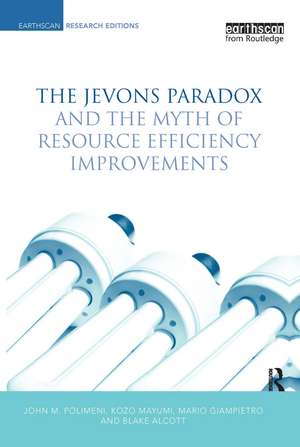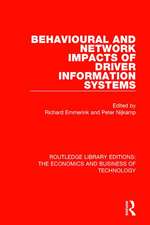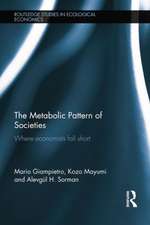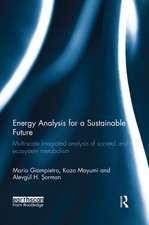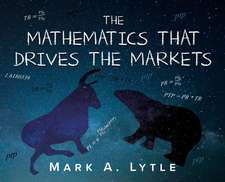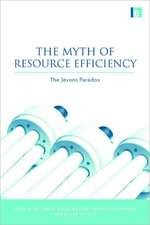The Jevons Paradox and the Myth of Resource Efficiency Improvements: Earthscan Research Editions
Autor John M. Polimeni, Kozo Mayumi, Mario Giampietro, Blake Alcotten Limba Engleză Hardback – 20 dec 2007
Din seria Earthscan Research Editions
-
 Preț: 362.80 lei
Preț: 362.80 lei -
 Preț: 408.28 lei
Preț: 408.28 lei -
 Preț: 380.03 lei
Preț: 380.03 lei -
 Preț: 274.28 lei
Preț: 274.28 lei -
 Preț: 436.14 lei
Preț: 436.14 lei -
 Preț: 442.68 lei
Preț: 442.68 lei - 12%
 Preț: 299.52 lei
Preț: 299.52 lei
Preț: 1002.95 lei
Preț vechi: 1223.11 lei
-18% Nou
Puncte Express: 1504
Preț estimativ în valută:
191.91€ • 200.91$ • 158.80£
191.91€ • 200.91$ • 158.80£
Carte tipărită la comandă
Livrare economică 05-19 aprilie
Preluare comenzi: 021 569.72.76
Specificații
ISBN-13: 9781844074624
ISBN-10: 1844074625
Pagini: 200
Ilustrații: Figures, tables, index
Dimensiuni: 156 x 234 x 20 mm
Greutate: 0.53 kg
Ediția:1
Editura: Taylor & Francis
Colecția Routledge
Seria Earthscan Research Editions
Locul publicării:Oxford, United Kingdom
ISBN-10: 1844074625
Pagini: 200
Ilustrații: Figures, tables, index
Dimensiuni: 156 x 234 x 20 mm
Greutate: 0.53 kg
Ediția:1
Editura: Taylor & Francis
Colecția Routledge
Seria Earthscan Research Editions
Locul publicării:Oxford, United Kingdom
Cuprins
Foreword by Joseph A. Tainter * Introduction * Historical Overview of the Jevons Paradox in the Literature * The Jevons Paradox: The Evolution of Complex Adaptive Systems and the Challenge for Scientific Analysis * Empirical Evidence for the Jevons Paradox * Conclusion * Index
Notă biografică
John M. Polimeni is assistant professor of economics at Albany College of Pharmacy, US. Kozo Mayumi is professor at Faculty of Integrated Arts and Sciences, the University of Tokushima, Japan. Mario Giampietro is an ICREA research professor in the Institute of Environmental Science and Technology at the Universitat Aut noma de Barcelona in Spain. Blake Alcott received his MPhil in the Department of Land Economy, Cambridge University, in 2006 and is now working as an unaffiliated scholar in Z rich.
Recenzii
'Given both the importance of the topic and the analytical and policy vacuum that surrounds it, a book devoted to Jevons Paradox is both timely and welcome... contain(s) a great deal of valuable material.' - Steve Sorrell, Science Policy Research Unit, University of Sussex
'This extraordinary and timely book focuses on a basic problem involved in achieving major energy conservation. As the authors explain, the Jevons Paradox emphasizes that simply reducing energy use in one system actually often results in increasing energy use in another system. The issue of sustainability cannot be handled just by looking for silver bullets ...' -David Pimentel, Professor Emeritus, Department of Ecology and Evolutionary Biology, Cornell University
'Efficiency first does not give frugality second; it makes frugality less necessary. But if we seek frugality first we get efficiency second as an adaptation to scarcity. Recognizing the Jevons Paradox, this book cogently argues, is the major key to a rational energy policy. Highly recommended!' -Herman E. Daly, Professor at the School Of Public Affairs, University Of Maryland, and former senior economist in the Environment Department of the World Bank
'This book is the most comprehensive attempt at dismantling the efficiency myth: it examines the subject from a variety of practical and theoretical perspectives, and while it may leave an unsuspecting reader rather depressed it leaves all of us better prepared to face the reality.' -Vaclav Smil, FRSC, Distinguished Professor, University Of Manitoba, Canada
'A thoughtful compilation of the best multidisciplinary approaches to modeling energy and resource use, looking at the extent to which energy efficiency leads to increased consumption and if so, how this price-determined effect can be mitigated.' - Hazel Henderson, Ethical Markets
'Truly fascinating... an enlightening, provocative work.' - Choice
'A remarkable and unsettling critique of energy policy.' -Crosslands Bulletin
'In this thought provoking book , the authors follow the Jevrons Paradox from its originator through time to our current debate on resource use and sustainability.'-Clean Technologies and Environmental Policy
'This extraordinary and timely book focuses on a basic problem involved in achieving major energy conservation. As the authors explain, the Jevons Paradox emphasizes that simply reducing energy use in one system actually often results in increasing energy use in another system. The issue of sustainability cannot be handled just by looking for silver bullets ...' -David Pimentel, Professor Emeritus, Department of Ecology and Evolutionary Biology, Cornell University
'Efficiency first does not give frugality second; it makes frugality less necessary. But if we seek frugality first we get efficiency second as an adaptation to scarcity. Recognizing the Jevons Paradox, this book cogently argues, is the major key to a rational energy policy. Highly recommended!' -Herman E. Daly, Professor at the School Of Public Affairs, University Of Maryland, and former senior economist in the Environment Department of the World Bank
'This book is the most comprehensive attempt at dismantling the efficiency myth: it examines the subject from a variety of practical and theoretical perspectives, and while it may leave an unsuspecting reader rather depressed it leaves all of us better prepared to face the reality.' -Vaclav Smil, FRSC, Distinguished Professor, University Of Manitoba, Canada
'A thoughtful compilation of the best multidisciplinary approaches to modeling energy and resource use, looking at the extent to which energy efficiency leads to increased consumption and if so, how this price-determined effect can be mitigated.' - Hazel Henderson, Ethical Markets
'Truly fascinating... an enlightening, provocative work.' - Choice
'A remarkable and unsettling critique of energy policy.' -Crosslands Bulletin
'In this thought provoking book , the authors follow the Jevrons Paradox from its originator through time to our current debate on resource use and sustainability.'-Clean Technologies and Environmental Policy
